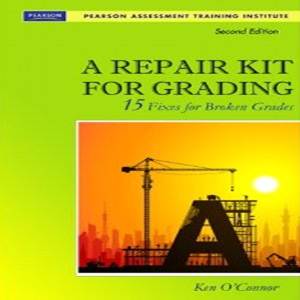The trouble with grading is….well…actually grading is just trouble.
Many have made the case as to why grading should be done away with entirely. We enjoy the work of Joe Bower (follow him on Twitter @joe_bower) and you can read his opinion on the subject here. Joe also cites a very professionally written, powerful and academic article by Alfie Kohn which you can read here. Either summarizes the case against grading effectively. If you as an aspiring Edunator decided your classroom would be better served without grades entirely, you'd not hear any argument from us. Frankly though, while grading possibly does more harm than good to the academic process, those who view the purpose of education as determining which students are most likely to succeed in the future (RE: Most of the world) would never allow for it’s ultimate destruction. More frankly, many teacher's aren't ready to teach without them.

Similarly, feedback is awesome. Feedback makes the world go round. Would Facebook be the sensation it is without the “Like” button? Would Twitter be as successful without the “Re-Tweet” feature? Why do people love these? Instant feedback! It could be argued that the premise of setting a goal and working with somebody that helps you achieve it is the biggest reason why team sports are so popular. Coach’s provide instant feedback, positive or negative, which is possibly a reason why the corporate world has fallen in love with the “coaching” model of leadership so much as well. People don’t mind getting better, they hate being bossed around.
Grading however is neither essential to learning nor is it feedback. It’s the arbitrary notion of assigning value to something that inherently has no value. Ken ‘O Connor denotes a difference between “Marks/Scores” and “Grading” noting that the former is given relative to an individual assignment or objective, whereas the latter is assigned as a summative evaluation at the end of some period of time.
And that’s just the problem. It’s a summative evaluation. It’s The End. And that’s just how many students interpret it.
In his book A Repair Kit for Grading: 15 Fixes for Broken Grades the aforementioned ‘O Connor defines grades as being broken when they:
1. Include ingredients that distort achievement
2. Arise from low quality or poorly organized evidence
3. Are derived from inappropriate number crunching
4. Do not support the learning process
And in these four little bullet points, Mr. ‘O Connor has summarized what we here at Edunators believe to be one of the biggest problems plaguing education, which is alarming given the ease at which this epidemic can be cured.
When grades are calculated in any of the ways in which ‘O Connor suggests, they no longer represent what they were intended to represent – student achievement.
One could make the argument that the purpose of grades is to assess a variety of things such as responsibility, maturity, work or college readiness, etc. Therefore, it’s important to include such things as late work penalties, bonus points for working hard or timeliness, completion or participation points, etc. To those people, we would simply ask “Then why include any academic data at all?” If your purpose is to assess things like responsibility, doesn’t including things like Social Studies test scores simply distort your responsibility data? Compiling so many factors into a composite score makes it impossible to determine what the skills were that are being assessed, or what the areas needing improvement are. This information is not only relevant to other teachers and administrators, but to other schools or parents as well.
So suppose your belief is that the purpose of grading is purely summative and not meant to provide feedback or specific, useful data for the purpose of improvement. Rather, you believe that grades are merely intended for the purposes of comparing students to one another. Do all of your colleagues agree with you? Or are some of them calculating their grades differently? If you’re not all calculating grades the same way, using the same data, do your grades serve as an accurate measure of comparing students to one another? Or are you of the opinion that your students are only competing against the ones in your classroom? Forget the “global economy” position…you’re not even sure how your students stack up against the kids next door using this model.
When a student receives a grade on a paper and nothing further is ever done with that paper, then the student feels an emotion – either positive or negative – and simply files that paper in the proper physical and emotional receptacle. Neither the great students, who are likely feeling indifferent because it’s just another “A”, nor the struggling students who’re either destroyed by the grade or numb to the process, are properly motivated or improved by this practice.
Furthermore, grading in the traditional sense damages more than just the student, it destroys the teachers as well. Hours upon hours spent pouring over research papers and tests, only to shove students into the shape of a letter. No teacher is exited to spend their reading 100+ copies of anything! It’s monotonous and boring, and teachers are intelligent professionals with family lives that need attention as well. That time spent going through the mindless marathon of grading two-foot stacks of paperwork is time that would be better spent by the teacher plotting elaborate, differentiated lesson plans, challenging activities or simply recharging batteries by spending time with family and better equipping to deal with the immense pressure of the job. Time spent reading professional literature, or even combing through Twitter could better help students than draining the life blood from the teacher by grading stacks of work the students didn’t care about when they made it much less what grade they receive on it.
Grading at all may do more harm than good, but “broken grades” almost certainly do, if they serve any purpose at all. Traditional grading practices serve only to exhaust teachers and demoralize students, while providing no positive feedback to students that would not also be replaced by far more effective assessment models. If you’re one of the many of the mindset that grades are never going away, like us, then we encourage you to Audit Your Gradebook, What's in a Letter Grade or see if Oral Defense Grading can help your classroom focus on learning.

